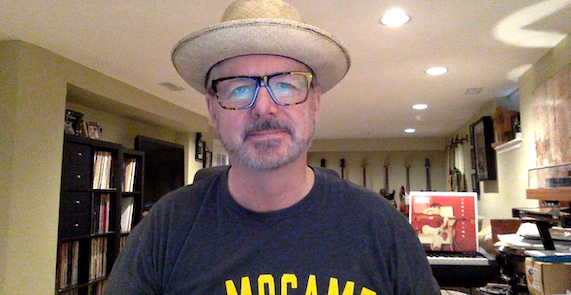Making Sense of it All with Anne Applebaum
 |
| Borja Alegre - The Atlantic, 2020 |
In the latest episode of, #ForWhatitsWorthwithBlakeMelnick, titled #MakingSenseofitAll Part 1,” we delve deeply into the intertwined narratives of history, politics, and personal experiences in the thought provoking essay, #HistorywillJudgetheComplicit by Pulitzer prize winning historian and author, #AnneApplebaum originally published in the#Atlantic in 2020
I began this episode following a month spent in New Zealand with my family, where the clarity gained from disconnecting from the constant barrage of news was a welcome reprieve. Upon returning to Canada, I found an intense political atmosphere marked by significant changes, in the wake of Trump’s ascendancy.
Mysteriously, as soon as I re-connected to the Internet, Applebaum's essay appeared at the top of my news feed. I initially didn't realize it had been published in 2020, and I began to read...
#HistoryWillJudgetheComplicit” serves as a lens through which we can examine the
behavior of individuals who support authoritarian figures against their
previously espoused democratic values. Applebaum emphasizes the complexity
of individual motivations behind this support, urging us to look
beyond surface-level judgments. She argues that understanding why
individuals align with such counterproductive ideologies requires
examining their personal histories and their justifications for abandoning in
a changing political environment.
The essay begins with a narrative account of the journeys of two
individuals from East Germany, Wolfgang Leonhard and Marcus Wolf.
Despite sharing similar beginnings in the Communist system, each took
opposing paths when confronted with the values and realities of their
regime. Their divergent choices provide a backdrop against which we can examine the broader themes of complicity and collaboration. Applebaum emphasizes the psychological mechanisms at play, explaining how
ordinary people can gradually normalize corrupt ideals, culminating in a
collective blindness to injustice.
Applebaum asks us to confront crucial questions like: Why do well-educated individuals, often
perceived as thoughtful and principled, fall into complicity with
ideologies that contradict their long-held moral convictions? By drawing
on extensive research from history, psychology, and political science, she offers a critical examination of the forces that compel
people to remain silent or even confer legitimacy on behaviors that
initially made them uncomfortable.
Readers and listeners are encouraged to
reflect on their own thoughts about political loyalty and societal
norms. The conversation points to the importance of self-awareness in
discerning the fine line between collaboration for perceived stability
and the active engagement that champions democracy and human rights.
As the episode winds down, I urge listeners to take an introspective journey, considering the
role each person plays in either upholding or challenging the structures
of power, particularly as Canada navigates its future in a politically
charged environment. The episode closes with a thought-provoking
reminder of the importance of being an informed citizen, where
understanding the intricacies of history may empower individuals to act
decisively in their contemporary political landscape.
Making Sense of it All - Part 2
In part 2, Applebaum highlights the phenomenon of the
effectiveness trap—where being in proximity to power can lead to a willingness to accept unethical behavior. She draws parallels with
figures from the Trump administration, who, by staying silent, have
inadvertently validated its harmful policies. This creates a perpetual
cycle of complicity that former officials and the public alike must
grapple with. It highlights how fear and the seductive nature of power
can cloud moral judgment, making it difficult for individuals to resist
participating in a corrupt system.
Throughout the episode,
Applebaum poses thought-provoking questions about our societal norms and
the limits of righteousness within our political framework. The
sentiments resonate deeply, as they shine a light on the human
propensity to compromise principles under pressure and the long-term
ramifications this can have on democracy. Historical events serve as
beacons for the current political landscape, illustrating how societal
complacency can open the door to tyranny and dysfunction with lasting
consequences.
Applebaum doesn't shy away from suggesting that
courage can be cultivated through the decisions we make daily, using the story of Lieutenant Colonel Alexander Vindman as an example. Vindman, a
prominent witness during the impeachment hearings of #DonaldTrump and his testimony against
unlawful actions, demonstrated a stark contrast to the silence of many of his contemporaries within the administration. Applebaum
emphasizes that while some choose to remain quiet out of fear of
consequence, leadership involves standing firm and
speaking truth in the face of personal risk ...Some might call this honour.
In a broader context, Applebaum
juxtaposes America’s political struggle with historical totalitarian
regimes where silent complicity thrived until it was nearly too late for
any dissenters. Drawing these historical correlations is not merely an
academic exercise but a rallying cry for the present. It urges us all to remain vigilant, evaluate our own positions,
and remember the weight of history as we navigate through a periods of
uncertainty here in Canada as well as abroad.
Applebaum reminds us of the essential core of character and decency needed in leadership, when she poses the question: What will history say about our choices in these tumultuous times? The dialogues crystallized in this episode of "For What It's Worth" serve as a critical reminder that, while history will indeed judge the complicit, it also opens the door for moral awakening, patriotism and civic responsibility. Small acts of courage serve as the seeds of resistance, leading the charge against corrupt systems. ... Please share these two episodes with anyone that believes in democracy ....For What it's Worth
Links to Discover
Making Sense of it All - Part 1
Making Sense of it All - Part 2


Comments
Post a Comment